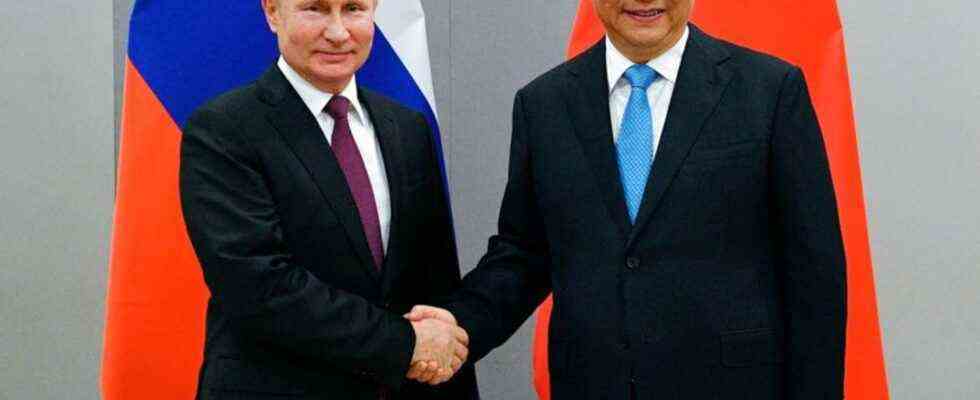cooperation
China and Russia demonstrate unity – Putin meets Xi
Vladimir Putin (l) and Xi Jinping come together for their first face-to-face meeting since the outbreak of the pandemic. Photo: Ramil Sitdikov/Pool Sputnik Kremlin/dpa
© dpa-infocom GmbH
Under pressure from the US, China and Russia are closing ranks. In the Ukraine crisis, Putin is seeking the support of his “friend” Xi Jinping. Moscow is now accusing the United States of an escalation.
In the Ukraine crisis and the growing tensions with the USA, Russia and China are demonstratively showing unity.
Before the meeting between Russian President Vladimir Putin and China’s head of state and party leader Xi Jinping in Beijing, the foreign ministers of both countries emphasized their willingness to cooperate more closely. The focus was on the Ukraine conflict, Afghanistan, North Korea and other international issues, as reported.
China is committed to a peaceful solution to the Ukraine crisis, but stands behind Russia, wants to see Russian security interests protected and rejects an expansion of military blocs such as NATO. “China is willing to work with Russia to deepen the long-standing friendship and comprehensive strategic coordination between the two countries,” Wang Yi said. China wants to “uphold international fairness and justice”.
As the only representative of a major country, Putin wanted to attend the opening ceremony of the Beijing Winter Olympics in the evening, which the United States and other countries are boycotting by not sending government officials. During their talks, Wang Yi and Lavrov jointly opposed the “politicization” of sport, according to China’s Foreign Ministry.
Moscow denies allegations
Efforts to find a diplomatic solution to the Ukraine crisis have been going on for weeks – but without any tangible results. Russia sharply criticized the US announcement that it would transfer an additional 2,000 soldiers to Europe, 300 of them to Germany. The Kremlin accused the US on Thursday of escalating the situation. Russia will now take measures “to ensure its own security and interests,” said spokesman Dmitry Peskov.
With Western reports of more than 100,000 Russian troops deploying near Ukraine, there are fears that the Kremlin is planning an invasion of its neighboring country. Moscow denies that. It is also considered possible that the Russian side wants to stir up fears in order to persuade NATO to make concessions on demands for new security guarantees.
Deployment of troops to Belarus
Russia has criticized the fact that the United States and its NATO allies responded to its offers to talk about a new security architecture in Europe by stationing more soldiers in Eastern Europe and supplying arms to Ukraine. On the other hand, NATO accused the Russian side of currently relocating around 30,000 soldiers to the partner country Belarus north of Ukraine.
Putin and Xi Jinping want to sign a joint statement “reflecting the common views of Russia and China on important global issues, including security issues,” the Kremlin said. Agreements on cooperation in the energy sector, among other things, are also to be signed. Trade rose 35 percent last year to $146 billion.
First meeting since the pandemic began
It is the first face-to-face meeting between Putin and Xi Jinping since the outbreak of the pandemic at the end of 2019. Since then, however, both have spoken five times by phone and held two video conferences. For two years, China’s president has not personally met a top politician from another major power, has not left the country and has not attended the summit of economic powers (G20) in Rome in October.
The Russian President, who is being honored in Beijing as a “Friend of China”, is the most prominent guest at the opening of the Olympics. Because of tensions with China and its human rights abuses, the celebration is boycotted by a number of countries, including the US, UK, Canada and Australia, which have not sent senior political representatives. Germany is also not represented in a similar way, but, like Japan, does not speak of a boycott.

